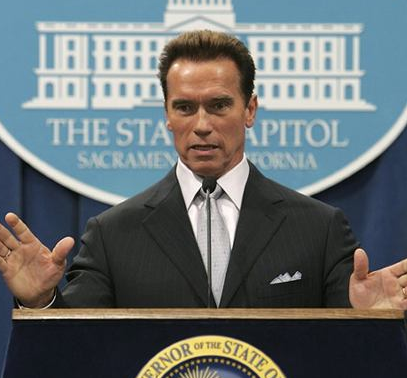 The California Assembly is expected to vote tomorrow night on legislation that would require 33 percent of the state’s energy to come from renewable sources by 2020 — a package that has sparked controversy, mostly over costs. Political divisions are still running deep as governor Arnold Schwarzenegger tries to strong arm its approval.
The California Assembly is expected to vote tomorrow night on legislation that would require 33 percent of the state’s energy to come from renewable sources by 2020 — a package that has sparked controversy, mostly over costs. Political divisions are still running deep as governor Arnold Schwarzenegger tries to strong arm its approval.
Opponents of the bill, SB 14, say it will require pricey construction of new power plants, transmission lines and other infrastructure (costing as much as $115 billion), forcing utilities to raise their rates and hurt consumers already grappling with a tough economy. On top of that, carving out land for renewable energy projects could instigate legal and environmental disputes. Some have even argued that the 33 percent target is infeasible.
This last claim isn’t just politicking, either. Three years ago, a bill passed requiring California utilities to generate 20 percent of their power from renewable sources by 2010. Such little progress has been made that a deadline extension of two to three years has actually been written into the new bill.
The legislation, expected to hit the floor of the Assembly today, was already passed by the state Senate, giving proponents some reason for optimism. The governor’s backing is also promising, with him sticking to his promise to veto any other bills before a renewable energy agreement is passed — even though it meant sending back a bill honoring Vietnam veterans, reports the San Jose Mercury News.
June 5th: The AI Audit in NYC
Join us next week in NYC to engage with top executive leaders, delving into strategies for auditing AI models to ensure fairness, optimal performance, and ethical compliance across diverse organizations. Secure your attendance for this exclusive invite-only event.
Those voting against the bill say they would be more amenable to it if some of the renewable energy could be generated out of state. As it’s written, there’s a strict requirement for all of it to come from within California, placing the cost burden squarely on its taxpayer’s shoulders. But the state’s grid is already so heavily integrated with those of its neighbors, that it only makes sense to share the load, opponents say. So far, the bill’s author, senator Joe Simitian (D-Palo Alto, Calif.), says he would compromise by allowing out of state contracts to be grandfathered into the new system. But for many, this still isn’t good enough.
The vote on the renewable mandates comes at a pivotal time. Not only is tomorrow the last day of the legislative session, it will also see votes on water reform and controversial cuts to California’s prisons budget.
